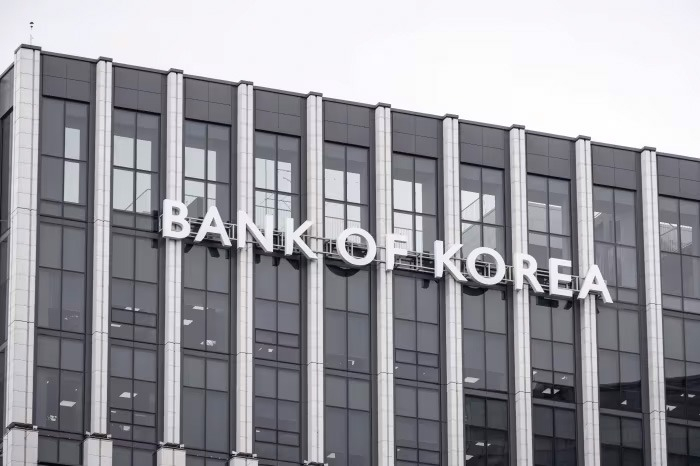Central bank
Bank of Korea holds rate steady, signals pivot to easing soon
The bank now expects GDP to grow 2.4% and inflation to average 2.5% in 2024
By The Wall Street Journal Aug 28, 2024 (Gmt+09:00)
2
Min read
Most Read
When in S. Korea, it’s a ritual: Foreigners make stops at CU, GS25, 7-Eleven


Maybe Happy Ending: A robot love story that rewrote Broadway playbook


NPS yet to schedule external manager selection; PE firms’ fundraising woes deepen


US auto parts tariffs take effect; Korea avoids heavy hit


NCSOFT invests in US game startup emptyvessel



South Korea’s central bank held interest rates steady but cut its inflation and growth forecasts for the year and signaled that it will pivot to easing in the coming months.
The Bank of Korea on Thursday kept its benchmark seven-day repurchase rate unchanged at a 15-year high of 3.50% for a 13th consecutive time—the longest such run in the country.
Twenty-four of the 27 analysts polled by The Wall Street Journal ahead of the decision had expected no rate change in August, but all forecast a rate cut in October or November.
BOK Gov. Rhee Chang-yong said Thursday’s decision was unanimous but the number of board members open to a possible rate cut in the next three months increased to four from two at the seven-member policy board.
“The board will examine the proper timing of rate cuts,” Rhee said. The board should look at more data before making a decision in either October or November, he added.
The central bank trimmed its estimates for gross domestic product and inflation this year in a revised outlook report that was released alongside the rate decision.
The bank now expects GDP to grow 2.4% and inflation to average 2.5% for 2024, compared with its May forecasts of a 2.5% GDP expansion and an average of 2.6% inflation this year.
Though stable core inflation, a possible U.S. rate cut next month and weaker domestic growth momentum support the BOK’s policy pivot, a mixed bag of fresh economic data and growing household debt could keep the bank from rushing to act.
Growth in Asia’s fourth-largest economy slowed at a sharper-than-expected pace in the April-June quarter on weak private consumption and investment, while inflation picked up more than anticipated in July on higher prices for agricultural and oil products amid bad weather and tensions in the Middle East.
The central bank still views inflation as trending lower despite the latest pickup fueled by the fluctuating agricultural and oil prices.
The country’s headline inflation accelerated to 2.6% in July from 2.4% in June, but core inflation, which strips out volatile food and energy prices, grew at the same pace for a third consecutive month, rising 2.2% on the year.
Rising home prices and a surge in mortgage loan growth will likely also keep the bank in a wait-and-see mode for now, as lower interest rates could fuel borrowing among households.
Many analysts expect that a U.S. rate cut in September could help trigger the start of South Korea’s policy easing cycle in the final quarter of 2024.
Write to Kwanwoo Jun at Kwanwoo.Jun@wsj.com
More to Read
-
 Central bankBOK signals autumn rate cut as inflation, economic growth slow
Central bankBOK signals autumn rate cut as inflation, economic growth slowAug 22, 2024 (Gmt+09:00)
3 Min read -
 EconomyKorea’s household debt hits record high on mortage loans
EconomyKorea’s household debt hits record high on mortage loansAug 20, 2024 (Gmt+09:00)
2 Min read -
 Foreign exchangeKorean won at 5-mth high; BOK may not lower interest rate
Foreign exchangeKorean won at 5-mth high; BOK may not lower interest rateAug 19, 2024 (Gmt+09:00)
4 Min read -
 EconomyBOK in limbo on rate decison with July inflation below 3%
EconomyBOK in limbo on rate decison with July inflation below 3%Aug 02, 2024 (Gmt+09:00)
3 Min read
Comment 0
LOG IN


